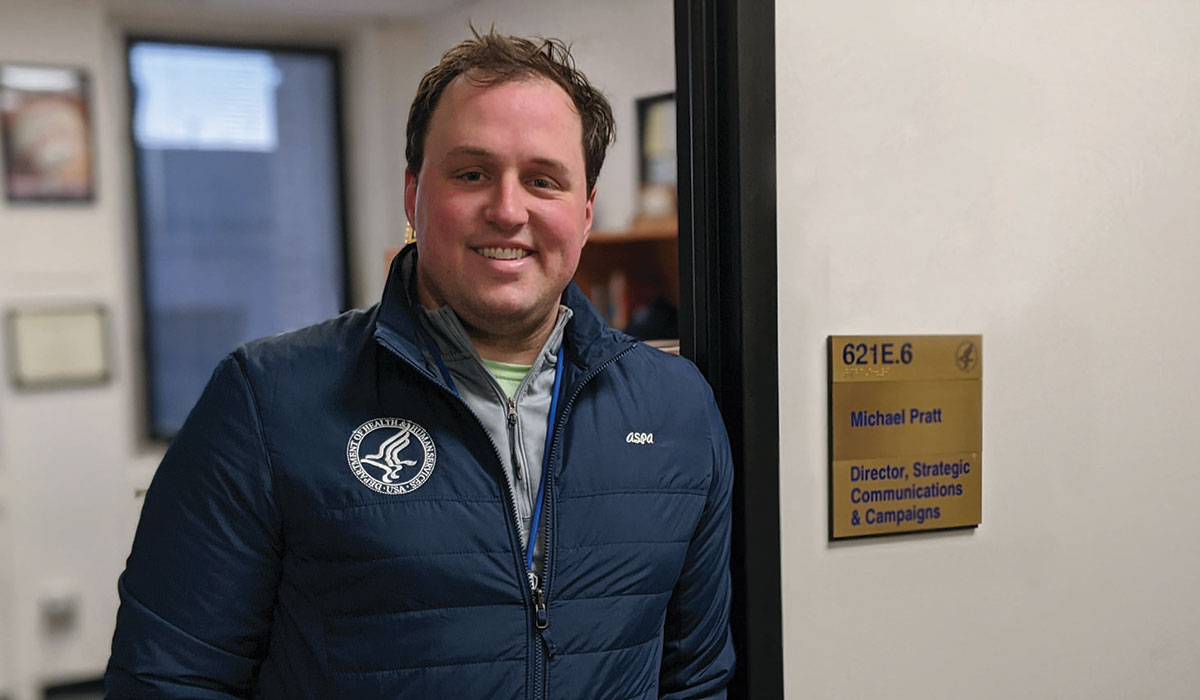

Shortly after the COVID-19 pandemic was declared, Michael Pratt, B.A. 2012, became the chief communications officer for Operation Warp Speed, a public-private partnership between the federal government, pharmaceutical companies, the military, and states to develop, manufacture, and administer COVID-19 vaccines as quickly as possible without cutting any scientific or safety corners.
The operation shows the power of people coming together, Pratt says. “When everyone rallies around the same goal, we cut through bureaucracy and partisanship, and things get done.” As a lead communicator during a time of crisis, Pratt says it was essential to “have hope, and be authentic and transparent.”
Pratt majored in philosophy and minored in rhetoric and writing. He credits his CatholicU education with preparing him for a career in policy and government communications. “Essentially, I’m reading complicated texts and trying to quickly understand and communicate the information so that people will understand and relate to it,” says Pratt.
After graduation, he worked for The American Enterprise Institute for Public Policy Research, building teams and systems to raise the profile of the institute.
This role led him to the U.S. Department of Health and Human Services (HHS) as the communications director for the Office of the Secretary. Pratt worked with the secretary’s team to execute strategic communication on issues such as the opioid epidemic, kidney disease, and organ donation.
Once the pandemic hit, HHS leadership made COVID-19 its priority. “It was a novel virus that we were constantly learning about, especially in the early days,” says Pratt. “We were making sure people understood all the work behind the scenes, even early on in the pandemic, such as ramping up PPE [personal protective equipment] production.”
In May, HHS announced Operation Warp Speed. Much of Pratt’s work focused on crafting messaging that was cleared with scientists and policy and legal teams. “We worked with coalition partners, like the Ad Council, that were already trusted voices within communities, that had platforms, like early coronavirus PSAs, to help amplify the messages that people needed,” he says. Pratt also helped to create the #COVIDStopsWithMe campaign that the U.S. Surgeon General used when speaking to the public, and helped launch a radio ad campaign about vaccines.
“We knew it would be incredibly important to make sure people could trust the vaccine and the process, especially with communities of color,” Pratt says. “It was amazing and reassuring to hear scientists, like Dr. Anthony Fauci [director of the National Institute of Allergy and Infectious Diseases], who worked on vaccines their whole careers passionately say, ‘Yes, this vaccine is safe — we’ve seen the process, no corners are cut, and we have the gold standard for clinical trials.’”
“Michael was one of the key leaders inside Operation Warp Speed, and his work to strategically expand our capacity to communicate this critically important information about the vaccines to the right people, at the right time, in the right way was really invaluable,” says Paul Mango, former HHS deputy chief of staff for policy. “He was trusted by the scientists, the military generals, the media, and leaders in the health department.”
Pratt left his position at HHS as part of the change in presidential administration. When he reflects on his work with Operation Warp Speed, he says it is surreal now seeing people receiving COVID-19 vaccines. “People sharing on social media, seeing my wife’s grandfather get the vaccine — it’s an indescribable and warm feeling. I know I only had a small part in this, but it’s a mixture of being proud of the work everyone did, disbelief that we’re actually now receiving the vaccine, and being incredibly hopeful about where we’re going to be in the future.”
— G.O.